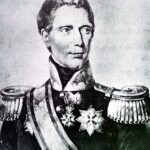DUNN, JOHN
- 3 Min Read
John Dunn (1833-1895), an English trader from Natal, settled in Zululand, and was made a Zulu chief by Cetshwayo in 1856. Later, when the British invaded Zululand in 1879, Dunn turned against Cetshwayo and supported the British.
The example of John Dunn is a dramatic illustration of some dynamics during Cetshwayo’s reign. The “Zululand trader,” such as Dunn, had been a feature of colonial life from Natal’s earliest days in the 1830s. These traders carried blankets, hoes, picks, knives, metal cooking utensils, cloth, beads and trinkets into the country to exchange for hides and the small, hardy Sanga cattle of Zululand which were highly prized in neighbouring territories. The commodities imported into Zululand were, for the most part, industrially manufactured versions of products which were made by the Zulu craftsmen or artisans.
John Dunn, as a young man, hunted and traded in Zululand, which he first entered in 1853. In 1856, when the sons of Mpande were vying for primacy and positioning themselves to attempt to assume the kingship, two factions were formed: the uSuthu faction around Cetshwayo, and the isiGqoza faction around his rival, Mulazi. Civil war followed. In a skirmish, later called Ndodakusuka (“Which man will be first?”), between these factions, and in which six of Mpande’s sons were killed, Dunn fought as a mercenary for Mbulazil.
When Cetshwayo emerged as victor in the war, Dunn became reconciled with him. The two men were of the same age. Needing a literate and bilingual adviser and secretary, Cetshwayo invited him to settle in Zululand, and made him a chief. Dunn adopted the Zulu way of life, married dozens of Zulu women, set up homesteads along the southern coastal strip, and entertained visiting members of the British aristocracy. At one time he was responsible for the administration of 10,000 people.
The situation changed, however, when the British invaded Zululand in 1879. Although at first Dunn attempted to remain neutral, he turned against Cetshwayo and sided with the British.
Garnet Wolseley, the British general conducting the campaign, captured Cetshwayo, and divided Zululand into 13 chieftainships, one of which he assigned to Dunn. Two years after this, Dunn attempted to become paramount chief of the Zulu, but failed. Upon the restoration of Cetshwayo in 1884, Dunn’s chieftainship remained independent of Zululand. At the time of Dunn’s death in 1895, he had 48 wives and 100 children, and was a major influence in the region. None of his children, however, was able to maintain his authority in the territory he had ruled.
WANDILE F. KUSE





